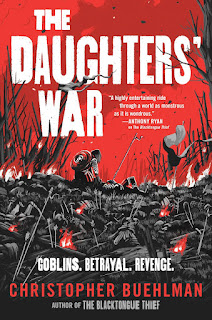Review - The Daughters' War by Christopher Buehlman
In this book, we see a different side to the world of The BlackTongue Thief. It's a prequel to that story and explores the events of the "Daughters' War", fought mostly by many widows and women soldiers. Galva (or Galvicha), the main character, is also female and from a noble background, and her viewpoint is a contrast to the first book's in many ways. We follow Galva and the army, as well as several other members of her family, as they move in several campaigns and looming battles.
There's a cynical tone in regards to the events she describes, and a message of the importance of telling the truth about what actually unfolded rather than how others have preferred to describe it afterwards. Despite a slow beginning, Galva's story of how her unit of magical bird warriors assists and redeems the war effort becomes a fulfilling tale of love, disappointment, humour, the importance of religion and courage in the face of traumatic events. At times, the author also lets shine the deftly sly or vulgar wit that he excels at, but in a more restrained way.
The story, as Galva tells it, is that of a resigned character caught up in the tragic and often bleak history of the war. The people tasked with fighting the goblins, the "kynd", are a diverse group from different nations. One of their main problems is they cannot agree among themselves. Among the ruling class, for every brave aristocrat there are many more who are instead held up as arrogant, foolish, corrupt, decadent, cowardly or licentious. Her fallen elder brother, Migaed, is a prime example. The priests of Sath (a sun god) are revealed as weak, and one battle's downfall is due to one tempted by a goblin drug, 'godsmilk'. The more common soldiers and knights, however, are the ones who are forced to make the real sacrifices, and this is the group Galva has joined.
There are two other viewpoints in the book, those of Galva's other brothers in the dom Braga family. Pol is a courageous capable military leader, misled by misplaced lover. Amiel is a peaceable, scholarly young apprentice to a formidable wizard, Fulvir. I enjoyed their letters that made up some chapters, which add a bit of variety and in Amiel's case, humour.
We get to appreciate the strong bonds between Galva's fellow corvid-trainers and their special birds. These bonds turn out to have a heavy cost when they must take part in a war, however. This is part of the reason that Galva's tale veers toward revenge and grimdark territory near the end. There are some surprisingly dark battle descriptions (goblins treat humans as a food supply, remember), which perhaps shows some of Buehlman's occasional horror background. But Galva ultimately finds a salvation and an ability to "let go" in a religion that worships "the Bride", a goddess of death, and also finds a refuge in the love of several characters.
Some of the highlights for me were the cynical disrespect with which most of the characters privately regard their superiors. There was a real sense of realism in the way the medieval-style army was portrayed, with its constant needs for supplies, fickle morale levels and the inevitability of internal conflict. Some of my favourite funny bits were the misadventures of Amiel while invisible (and naked), and the trash-talking between Galva and an old soldier. However, I wasn't a big fan of some of the mystical sections in the story to do with the Dal-Gaata religion, and one chapter which tells one their stories just lost me. And at times there are some sentimental, wistful musings by Galva that seemed like indulgence.
However, this is yet another winning fantasy yarn by Christopher Buehlman and I wouldn't hesitate the read another set in this same world.
Rating: 4 stars (out of 5)
⭐⭐⭐⭐




No comments:
Post a Comment